Former Illinois State Representative Jeanne Ives | Jeanne Ives/Facebook
Former Illinois State Representative Jeanne Ives | Jeanne Ives/Facebook
Breakthrough Ideas CEO Jeanne Ives has launched scathing criticism against the recently proposed race-based funding program for universities in Illinois.
Spearheaded by the Illinois Board of Higher Education and progressive Democrat legislators, the proposal assigns monetary values to students based solely on their race, with black students deemed worth $6,000, hispanics $4,000 and rural students $2,000, while white and Asian students receive no additional funds.
Describing the initiative as "obviously racist," Ives denounced the plan as a product of the insulated bubble of higher education.
“The funding program these elitists conceived is so obviously racist that only someone in the bubble of higher ed would propose it,” Ives told Prairie State Wire.
“I'd like to ask the people on the commission and the wealthy individuals who funded the study value their own workers based on race and offer more support to them based on race.”
“The most maddening thing is that the experts failed to even look at why education costs so much more in Illinois. They also ignored to mention that Illinois taxpayers fund higher education more than any other state on a per student basis.”
“No one should take this report seriously. What a waste of time and money.”
Ives, a former state representative and gubernatorial candidate, hosts a radio show on WIND-AM 560 named “The Real Story” where she recently discussed the topic with State Sen. Chapin Rose (R-Mahomet).
“You can’t discriminate based on skin color,” Rose said. “What decade is this?”
On Breakthrough Ideas’ blog, Ives wrote about the controversial plan to fund higher education based on race, which has sparked outrage and legal concerns.
This initiative, dubbed the Equity Adjustment Funding (EAF), has drawn criticism for its potential violation of civil rights laws and recent Supreme Court rulings against race-based admissions.
Backed by a commission claiming systemic racism in higher education, the report argues for increased funding to address disparities, yet fails to consider crucial factors such as the high cost of education in Illinois and declining enrollment rates.
Despite Illinois leading in state support for higher education, concerns persist over the effectiveness and fairness of the proposed funding model.
Additionally, the commission's reliance on leftist funding sources and failure to acknowledge potential loss of federal grants due to discriminatory practices raise further questions about its legitimacy and priorities.
As debates over educational equity unfold, skepticism mounts regarding the efficacy of race-based funding and the true motives behind such initiatives.
Critics advocate for a more pragmatic approach, focusing on efficiency and cost optimization rather than divisive and potentially unlawful funding strategies.
Opponents have also questioned the funding model's feasibility and complexity of the proposed model which outlines four core elements, including determining the optimal funding each institution needs and closing the gap between allocated and needed funds.
“As someone who has spent nearly 20 years studying state budgets, I’m not sure I can explain how equitable student share works. And I think that’s telling,” Jennifer Ann Delaney, previously a professor at the University of Illinois Urbana-Champaign and currently serving as an education professor at the University of California, told Inside Higher Ed. “It’s hard to know, in something so complex, how to predict what likely outcomes are and it’s worrisome.”





 Alerts Sign-up
Alerts Sign-up